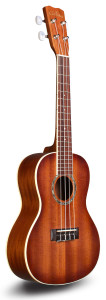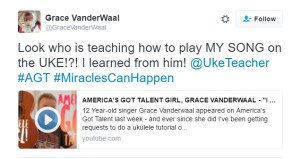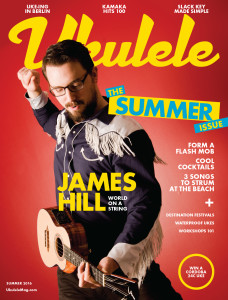Monday, June 20, 2016
Sunday, June 19, 2016
Wednesday, June 15, 2016
Deep In The Heart of Ukulele at the Kerrville Folk Festival
Text and photos by Jim D'Ville
You can't get much deeper into the heart of Texas than the Hill Country city of Kerrville, an hour drive northwest of San Antonio. If you had visited Kerrville in 1929, you may have seen the “Father of Country Music,” Jimmie Rodgers, playing downtown on the corner of Water Street and Fredericksburg Road (Rodgers moved there in 1929 for his health). But these days Kerrville's musical claim to fame is the Kerrville Folk Festival. For the last 45 years, the festival has been an annual 17-day-long homecoming for both novice and professional singer-songwriters. Notable musicians who got their big break through the Kerrville New Folk Contest include Steve Earle, Nanci Griffith, and Lyle Lovett.
But for the last four years, the Kerrville Folk Festival has accepted a new instrument into its folk-family fold: the ukulele. Dalis Allen, KFF Producer, explains her decision to add a three-day ukulele workshop camp into the Kerrville festival. “I knew that the ukulele had been gaining in popularity as it's a very accessible instrument. I stopped Del Rey, who has been a major force on the ukulele for years, in the hallway at Folk Alliance and asked what she thought of the idea. It was hatched then and it has been a great addition to the workshop offerings at Kerrville.”
This year's event was held May 26–June 12.
Rey, from Seattle, Washington, has been the Director of the Kerrville Ukulele Camp since its inception in 2013. She explains how the Kerrville uke camp schedule differs from other camps and retreats. “I try to incorporate enough time in the schedule so people can absorb what they've just heard and are learning to play. Learning a tune is like watering the lawn, you don't want the water just running down the sidewalk! I also like having a couple all-camp classes, where three instructors teach as a team. That way, the lead instructor has back-up, and the students have individual attention without feeling like they are interrupting the flow of the class.”
Past instructors at the Kerrville Folk Festival ukulele camp have included James Hill, Victoria Vox, and Aaron Keim. This year's trio of instructors consisted of Del, string wizard Daniel Ward from Los Angeles, and myself.
The Kerrville Folk Festival Ukulele Camp is normally held the first week in June and runs for three days, 10 am to 3 pm. All classes at the camp are held at the Threadgill Theater, a covered, open-air venue on the festival grounds. Lunch is provided each day of classes as is an evening folk concert that takes place each night at the Threadgill from 7 pm to 9 pm.
Meg Hoke, a three-year veteran of the uke camp from Asheville, North Carolina, says, “It's such a laid-back atmosphere at the Kerrville Ukulele Camp. From the first minute of the camp, there is no intimidation. It's a very supportive environment, both from the instructors and the other students. I've really been able to build upon my skills every year.”
The Kerrville Folk Festival is part Woodstock, family reunion and three-week jam session all rolled into one. The dedicated festival grounds are the Quiet Valley Ranch, located eight miles southwest of Kerrville. The image line for the festival is “Welcome Home,” since many of the participants have been coming to the festival for decades it really is a musical homecoming. Most tend to congregate in well-established tent camps with friends while others go the trailer or RV route. For the less adventurous, the comfortable Y-O Ranch Hotel in Kerrville is also an option (that's where the instructors stay).
One of the highlights of visiting the Texas Hill Country is the food. This year's trip to Kerrville included multiple breakfast trips to the Hill Country Cafe, a Texas legend since 1942; Bill's Bar-BBQ, also in Kerrville, proved to be the real deal in Texas BBQ; and for the more sophisticated palates, Grape on Main Street in Kerrville was a lovely dining option.
Since the ukulele camp workshops finish up at 3 o'clock every day, it leaves ample time to explore the surrounding countryside. An annual activity for the instructors is a refreshing swim in the Guadalupe River, which runs through downtown Kerrville. With temperatures normally in the high 80s with some humidity, an afternoon dip in the Guadalupe is a welcome respite.
With the average yearly attendance around 30 students, the excellent student-to-teacher ratio makes for a lot of one-on-one interaction and individualized instruction. And if you're into the singer-songwriter aspect of the ukulele, this event is a must for you.
For more information on the Kerrville Folk Festival and the KFF Ukulele Camp, visit www.kerrvillefolkfestival.org.
New Ukes from Cordoba
By Greg Olwell
Cordoba is introducing two new ukuleles--at next week's Summer NAMM show in Nashville, Tennessee.
Two new ukuleles expand on the format and design of the company's top-seller, the all-mahogany Cordoba 15CM. First up is the 15CM-E concert, which has an undersaddle pickup and a matte 'burst finish. And, for players who may want the popular concert-sized model, but with the room and voice of a tenor, the 15TM features similar appointments, scaled up to tenor size.
Though not technically a ukulele, the company's new Mini SM-CE might appeal to players looking for a small instrument with an extended range. Billed as a travel-sized guitar, the six-string Mini SM-CE features a spalted maple body with a solid cedar top, a cutaway, and a pickup. It has a 20-inch scale and uses custom Aquila strings for an A-to-A tuning. (An E-tuning set is also available.)
SPECS
15CM-E Concert with pickup
- Mahogany top, back, and sides, abalone-style rosette, cream body and fingerboard binding
- Mahogany neck with rosewood fingerboard, 35mm nut width, 375mm scale length
- Matte edge-burst finish
- Cordoba undersaddle pickup
- Aquila Nylgut 7U strings
$129.99 (street)
15TM Tenor
- Mahogany top, back, and sides, abalone-style rosette, cream body and fingerboard binding
- Mahogany neck with rosewood fingerboard, 35mm nut width, 432mm scale length
- Matte finishAquila Nylgut 10U strings
- $99.99 (street)
Mini SM-CE
- Solid cedar top, spalted maple back, and sides, padauk binding
- Mahogany neck with rosewood fingerboard, 50mm nut width, 510mm scale length
- Matte finish
- Cordoba 2Band pickup
- Aquila Mini strings
- Cordoba gig bag
- $329.99 (street)
For more information, visit Cordoba's website.
Tuesday, June 14, 2016
Monday, June 13, 2016
America's Got Talent's 'Uke Girl' Receives Pleasant Surprise Lesson-From Her Teacher
By Greg Olwell
Showing the speed of the contemporary culture, online ukulele video instructor John Atkins has already posted a lesson of last week's viral video by 12-year-old Grace VanderWaal on America's Got Talent.
Under his YouTube channel, The Ukulele Teacher, Atkins created a lesson of “I Don't Know My Name,” a stunner of a song written by VanderWaal and performed on an episode that aired June 7.
Well, Atkins' lesson received a big boost on Sunday, when VanderWaal posted the following tweet on her Twitter account, showing surprise that she learned to play from watching his videos and now he was teaching her song.
Wednesday, June 8, 2016
12-Year-Old Wows America's Got Talent, Called “The Next Taylor Swift”
By Greg Olwell
Accompanying herself on a ukulele, 12-year-old Grace VanderWaal wowed the judges and the audience on last night's America's Got Talent. Seconds into her song, “I Don't Know My Name,” the Suffern, New York student was getting cheers of approval from the crowd and shortly after finishing, the judges gave her a special acknowledgement that advanced her in the show.
Judge Howie Mandel rang the show's golden buzzer, a concept that each judge is allowed to use only once a season. When a judge rings this buzzer, the contestant automatically advances to the show's quarterfinals, bypassing the other judges' votes.
While still holding her Luna Uke Tattoo Concert onstage as her family swarmed, judge Simon Cowell smiled and said, “I think you are the next Taylor Swift.”
Check her out on Twitter, @GraceVanderWaal
Tuesday, June 7, 2016
Monday, June 6, 2016
Thursday, June 2, 2016
The Tiny Ukulele Makes Major Inroads In Berlin
From the Summer 2016 Issue of Ukulele Magazine | BY ELIZABETH RUSHE
In cozy bars and venues dotted around Berlin, Germany, ukulele meet-ups attract lively crowds, from multi-instrumentalists to novices, as well as those who simply want to sit back and enjoy an evening of uke tunes. Much of Berlin's active ukulele scene can be traced back to Leleland, a welcoming ukulele shop in Kreuzberg, which claims to be the largest of its kind in Europe.
Harald Truetsch, who plays ukulele in a rock band named Toxic Tones, opened Leleland seven years ago and organized some of the first ukulele gatherings in Berlin. Truetsch reflects that most of his customers are from abroad. As he says this, a pair of giddy German teenagers tumble in to purchase their first ukulele. Truetsch plucks the instrument expertly to tune it before handing it over. With a beckoning wall of ukuleles and Truetsch on hand to offer advice, the shop is stocked with rarities, such as the limited-edition Ibenez with a Steve Wei fretboard inlay; a custom-made ukulele by Australian guitar luthier Cole Clark; and German-made ukuleles. Leleland does get a lot of international customers, however-people hear about the shop and put it on their must-see itinerary when visiting Berlin. Truetsch is particularly proud of a recent visit by Tomoki Sato-the internationally renowned Japanese ukulele player, vocalist, and composer.
Harald Truetsch and Leleland
The shop was the initial meeting place for the longest-running uke meet-up in Berlin: the Ukulele Stammtisch (stammtisch means regulars' table). It started seven years ago and now meets twice a month-every second Thursday and every last Tuesday in Lagari, a cozy bar in the neighborhood of Neukölln. Organizer Matthias Müller-Guth says the Stammtisch is open to everyone, from beginners to advanced players-the vibe is friendly and welcoming, there's a willingness to share technique and skills with those who are learning. This group is especially ideal if you want to improve your German, since all members are local (though happy to chat in their excellent English, too), that is to say, they're “actual” Berliners, which believe it or not can be quite rare in this city. Order a locally brewed beer from the bar, and you're all set. Many who regularly attend the Stammtisch group are active in their own ukulele bands and orchestras, such as the Gentle Ukes (the-gentle-ukes.de), Berlin's all-ukulele orchestra. The orchestra practices on Fridays, and interested uke players can participate in a few practices before they sign up to be a member of the orchestra, which celebrates it's sixth anniversary this year.
Uke Boogie is another regular ukulele meet-up in Berlin: a lively night of open-mic spontaneity that takes place once a month, organized by Alex Highet, originally from Scotland. Highet brought the Uke Boogie night with him when he moved to Berlin-the Boogie will have been running for three years in May of this year. Each month, in addition to the glory of performing in front of a delighted audience, the Boogie crew raffles a ukulele to a lucky member of the crowd. Instrumental diversity is encouraged, along with ukuleles.
“We try to encourage more unusual instruments, so we ask that guitar players leave their guitar at home,” Highet notes on the club's Facebook page.
Most people who get up to play perform on ukulele, but you might also be treated to a Kanye West cover on mandolin, or a cover of the Magnetic Fields' “Love is Like a Bottle of Gin,” accompanied on the box drum.
All styles of ukulele performances are welcome. A typical night includes German punk, French chanson, '90s indie-rock, and hip-hop. A highlight one evening was Highet's performance of an original song he'd written especially for Jonathan Richman, which led to a discussion on how to get a video of the song to the quirky American singer-songwriter, who apparently only communicates by snail mail. Uke Boogie attracts an equally friendly, slightly more international mix of people, including both players and audience.
And, of course, the prize-a ukulele-is a great reason to start learning to play.
WHERE TO UKE IN BERLN
Leleland Ukulele Shop
Ukulele shop in Kreuzberg
Uke Boogie
Open mic for ukuleles and other instruments that aren't guitars, every second Wednesday of the month. Uke Boogie is in between venues at the moment, check their Facebook page for new venue confirmation.
Berlin Ukulele Stammtisch
Every second Thursday and last Tuesday of the month.
Cogg Guitars & Ukuleles
Looking for a custom souvenir to bring home? Visit luthier Gary Neath at Cogg Guitars.
Nalu Diner
A taste of America, with a Hawaiian influence. All-day breakfast includes buttermilk pancakes, hash browns, eggs benedict, and bottomless coffee (a novelty in Berlin!). Co-owner James Kroll grew up in Hawaii, reflected in the name “Nalu,” meaning surf, as in a wave that's breaking.
The Konzerthaus
A beautiful, historic music venue, which hosts about 550 events a year. If you're in Berlin on May 8, don't miss the Ukulele Orchestra of Great Britain.
This article originally appeared in the Summer 2016 issue of Ukulele magazine.
Subscribe to:
Comments (Atom)







